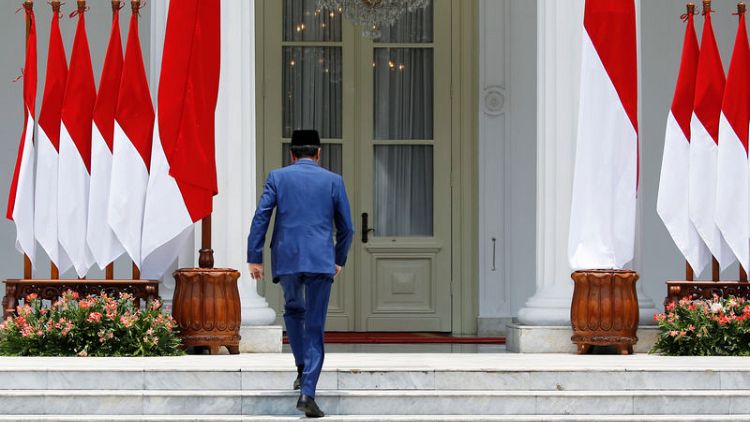By Ed Davies
JAKARTA (Reuters) - Indonesian President Joko Widodo took what appeared to be his biggest political gamble on Wednesday by including controversial former general Prabowo Subianto in the cabinet, his main rival who has long harboured ambitions for the presidency.
Prabowo, a 68-year-old former special forces commander, has been accused of human rights abuses and trying to grab power after his then father-in-law Suharto was ousted from the presidency in 1998.
An opposition leader during Widodo's first term and with unsuccessful runs for the presidency in 2014 and again this year, Prabowo has now been named defence minister.
On the campaign trail, critics said his message, much like U.S. President Donald Trump in 2016, amplified potential threats to the country. In speeches, he often said Indonesia was on the verge of fragmentation, exploited by unspecified foreign powers.
But after failing to overturn Widodo's election victory through the courts, Prabowo and Widodo patched things up at a number of meetings in recent weeks - dismaying many of their own supporters.
"Prabowo is a huge gamble for Jokowi. He could turn out to be an excellent defence minister who carries Jokowi’s agenda," said Evan A. Laksmana of the Jakarta-based Centre for Strategic and International Studies, using the nickname of the president.
"Or Prabowo could be a disaster, with bureaucratic infighting with the broader security establishment and the politicisation of the defence establishment heading to 2024," added Laksmana, referring to the date of the next election
Prabowo comes from an elite political family. His father was one of Indonesia’s most prominent economists, serving in the cabinets of the country's first two presidents Sukarno and Suharto.
But Prabowo has been dogged by persistent allegations of human rights abuses, in particular during the economic crisis that led to Suharto's downfall in 1998.
Suharto's replacement B.J. Habibie has said the second night after he was sworn in, Prabowo showed up at the presidential palace, armed and with a squad of special forces soldiers, and tried to stage a coup.
Shortly thereafter, Prabowo was discharged from the army for breaking the chain of command and ordering troops to arrest activists.
He has repeatedly denied the allegations against him or said he was following orders.
After his swearing in on Wednesday, a relaxed-looking Prabowo said he would immediately head to his ministry.
"I will learn the latest situation and then we will begin work," he told reporters.
PRACTICAL BENEFITS
It was a far cry from this year's bitterly fought election, when Prabowo had initially refused to concede defeat and eight people were killed and more than 900 wounded during rioting in Jakarta after rallies by his supporters descended into clashes with security forces.
For Widodo, his inclusion could have practical benefits by making it easier for the government to push through legislation, given that with the backing of Prabowo's Gerindra party, government support in parliament increases to 74%.
Fakhrul Fulvian, chief economist at Trimegah Sekuritas, said Gerindra's inclusion "will be positive" for planned economic reforms by ensuring they get firm support from parliament.
He noted, however, that by increasing the number of parties in the coalition, it could make it harder to execute reforms.
Rights activists say Widodo is going too far in pushing his agenda.
"The president has just handed control of the country’s defence forces to someone implicated in crimes against humanity, including enforced disappearances, by Indonesia’s own human rights commission," Usman Hamid, director of Amnesty International in Indonesia, said in a statement.
"The cabinet shows that his (Widodo's) political pendulum is in the direction of efforts to achieve something without caring much for how to achieve it," said Hamid, describing the inclusion of Prabowo as the "politics of accommodation".
Wellian Wiranto, an economist at Singapore's OCBC Bank, called Prabowo's appointment "a bold bid for national unity."
He added: "Whether it works out or not may well turn out to be more crucial to Indonesia than policies per se."
(Additional reporting by Fanny Potkin, Stanley Widianto and Gayatri Suroyo; Editing by Raju Gopalakrishnan)
